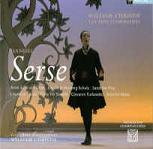Serse is a great opera, filled with terrific arias and a followable plot. There’s plenty of room for in-love pain and anguish from Romilda and Arsamene (Serse’s brother) who love each other, Princess Amastre, who Serse has dumped in favor of Romilda (who doesn’t love him), and Atalanta, who loves Arsamene. But there’s great humor and irony as well: Serse changes his mind like a spoiled brat, and his protestations of love are brief and whimsical (in fact, he falls in love with Romilda on the spot, after hearing her sing!); Atalanta seems to get great joy out of spitefully playing the being-in-love game. Arsamene’s servant, Elvino, is a goofball (the only totally comic character in any Handel opera), while Ariodate, a soldier in Serse’s army and the father of Romilda and Atalanta, is an idiot. Amastre’s disguise in male clothing to get revenge on Serse adds to the intrigue.
Despite one truly stinking performance, this undertaking is wonderful–full of spice and led with energy. The recitatives are remarkably vivid and give us the impression that what’s going on is happening in real time. Anne Sofie von Otter’s Serse (it was a castrato role) is splendid. The voice seems not to be as full as it once was, but it’s still gorgeous; she delivers her lines with real bite and self-importance, and her singing, from the opening “Ombra mai fu” onward, is full of original touches. She not only embellishes wisely, but she also bends the rhythm to emphasize a point and colors her tone using dynamics that are sometimes startling, spitting out consonants whenever she (he) has an emotional flare-up. And her ease with coloratura and legato is divine.
Silvia Tro Santafé makes a fine Amastre, expressing anger and fed-upness without exaggeration and using the dark lower third of her voice to fine effect. Antonio Abete’s Elvino is rich-voiced and his falsetto is glorious–he has to disguise himself as a flower-seller at one point, and it’s almost visual. Countertenor Lawrence Zazzo practically walks away with the show as Arsamene; his voice seems big for its type, he sings fearlessly and accurately (the occasional pitch variation aside), and his impeccable diction adds to his credibility. I’m not sure who thinks that Elizabeth Norberg-Schulz is a good enough singer to be in such company, but her Romilda is not worthy of having the love of one, let alone two men. Her singing is sour and her impersonation is bland. She’s an annoying soubrette. The lovely Sandrine Piau, who sings Atalanta, should have been given the role: not only does it sit higher than Atalanta, where Piau is more comfortable, it is more worthy of loving. But Piau, by embellishing Atalanta’s music, shows her upper register off to grand effect. Giovanni Furlanetto’s Ariodate is a fine buffo.
William Christie paces ideally and Les Arts Florissants makes the most of Handel’s tone coloring–Serse uses a particularly large orchestra. The recorders tootle delicately and the horns and trumpet ring out, while the strings can be either mellow or, when needed, underscore a strident dramatic moment. This performance bristles with drama. The Conifer recording under Nicholas McGegan is just as well led and the singers are quite good, but this set’s Otter and Zazzo are so sparklingly right that they both outweigh the problems created by Norberg-Schulz and tend to make us forget McGegan’s cast.
































